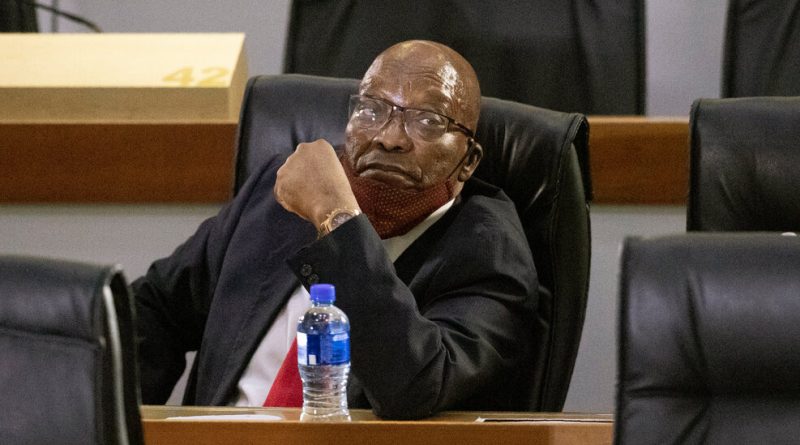Zuma Risks Arrest After Defying South Africa Corruption Inquiry
[ad_1]
CAPE TOWN, South Africa — Jacob Zuma, the former president of South Africa whose nearly decade-long tenure was tainted by breathtaking corruption scandals, refused to appear before an inquiry panel Monday, raising the possibility that he would be imprisoned for contempt.
The panel’s leader, Deputy Chief Justice Raymond Zondo, said he was seeking an order from the Constitutional Court, the country’s highest court, that would “impose a term of imprisonment on Mr. Zuma.”
Justice Zondo’s move catapulted the simmering theme of corruption during Mr. Zuma’s term, which lasted from 2009 to 2018, into a tense showdown over the accountability of the former president. His successor, Cyril Ramaphosa, has promised to purge the governing African National Congress of endemic problems of bribery and graft that have severely damaged its credibility in South Africa, one of the continent’s most important economic powerhouses.
Mr. Zuma, 78, had been set to appear before the inquiry panel, the Commission on State Capture, starting Monday for a week of testimony about his role in the corruption. The former president sent a letter from his lawyers instead, arguing that he was not legally bound to appear.
It was Mr. Zuma who instituted the inquiry in 2018 after a report detailing the extent of corruption in state-owned companies and government departments during his administration. In its far-reaching mandate, the commission has interrogated more than 250 witnesses.
Mr. Zuma is the first to refuse, demanding that Justice Zondo recuse himself. Mr. Zuma has accused the justice of harboring a personal vendetta against him and has pointed to a distant family relation. In uncharacteristic frustration, Justice Zondo rejected these claims.
“I’ve just completed 24 years of service on the bench as a judge and many litigants have come and gone and have appeared before me, literally thousands in trials, motion court and appeals and only Mr. Zuma, out of all of these, has asked me to recuse myself,” he said.
It was not immediately clear when the Constitutional Court would decide on Mr. Zondo’s request that Mr. Zuma be punished with imprisonment. Mr. Zuma, who has denied any wrongdoing, retains considerable support within the country, and the prospect that he could be arrested and imprisoned raised the risk of protests by his sympathizers.
Should the Constitutional Court find Mr. Zuma’s behavior does not warrant punishment, it may encourage other witnesses to defy the corruption inquiry and undermine its purpose.
Mr. Ramaphosa, formerly Mr. Zuma’s deputy, won the A.N.C. leadership in 2017 after a bruising internal battle. Soon afterward, he forced Mr. Zuma to step down as president, a humiliating defeat that Mr. Zuma has not forgiven.
Mr. Ramaphosa’s vow to root out corruption and patronage within the A.N.C. has faced strong resistance from a rival faction within the party. The A.N.C. has dominated South African politics since the end of the apartheid era.
In the letter from his lawyers, Mr. Zuma argued that he did not have to appear before the corruption panel because his request that Justice Zondo recuse himself was still under review. Mr. Zuma had first raised this issue when walking out of a corruption panel hearing in November, refusing to testify before Justice Zondo.
But the Constitutional Court, in a ruling last month, said Mr. Zuma was still required to appear and give evidence.
In anticipation of an arrest warrant for Mr. Zuma, dozens of veterans from the A.N.C.’s former armed wing, uMkhonto weSizwe, camped around the former president’s homestead in Nkandla, in rural KwaZulu-Natal province about 300 miles southeast of Johannesburg. The veterans told the South African Broadcasting Corporation that they would remain until the end of the week to prevent the police from taking Mr. Zuma into custody. They were joined by supporters of Mr. Zuma, who sang and chanted their fealty to him.
Mr. Zuma’s stance has threatened to polarize not just factions within the A.N.C. but the country, some members of the party said.
“If he gets arrested, it’s perfectly clear that society will be divided into two groups,” said Mdumiseni Ntuli, the party’s secretary in KwaZulu-Natal. Mr. Ntuli and other members of the provincial leadership met with Mr. Zuma over the weekend to try to convince him to adhere to the law, Mr. Ntuli told the South African Broadcasting Corporation.
“The implications to the unity and the cohesion of the A.N.C. are going to be very profound,” Mr. Ntuli said of the possible arrest.
That the A.N.C. could not force Mr. Zuma to abide by the law is a sign of the party’s inability to hold its senior leadership accountable, said Prof. Susan Booysen at the University of the Witwatersrand.
“It really shows up so many weaknesses of the A.N.C.,” she said. “The A.N.C. could not put its foot down and say, ‘You will appear.’”
Ms. Booysen, who is the author of a recent book, “Precarious Power: Compliance and discontent under Ramaphosa’s A.N.C.,” also said it was clear that the governing party was no longer a singular movement but “an alliance of many different identities, political factions and financial interests held together by its compulsion to hold on to power, make money and the legacy of being seen as a liberation movement.”
